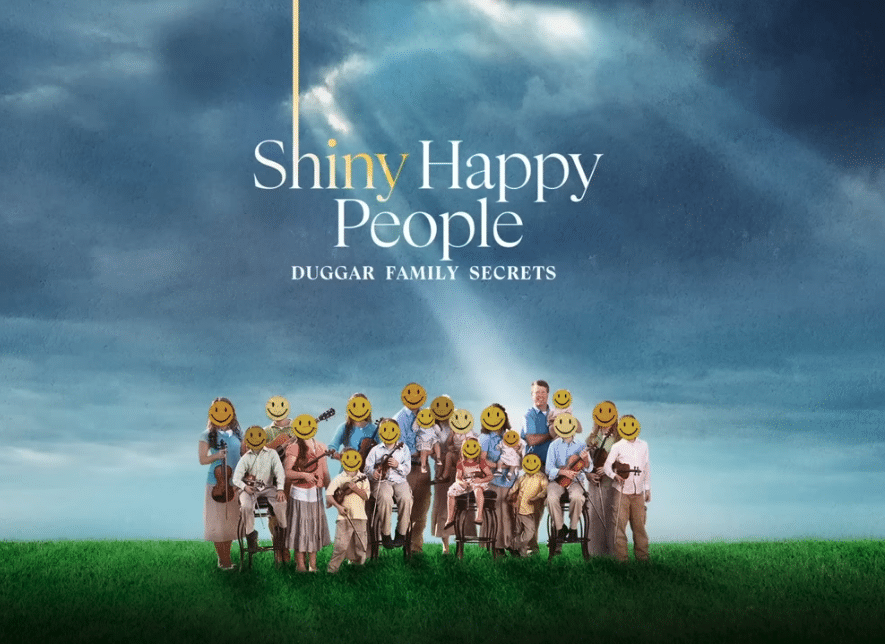After watching the recent documentary “Shiny Happy People” on the Duggar family (of “19 Kids and Counting” fame), I can finally put into words why I no longer want to write or speak “as a Catholic.” The commercialization of evangelization and testimonies is a part of a spider web that all of us can easily get caught in, both as creators and followers (whether it be social media or on reality TV, like the Duggars).
The Duggars’ show on TLC ran from 2008 to 2015. They were very popular with large families and the homeschooling community, and they became the poster family for Christian family values. What people didn’t know at the time was that the family was struggling with something serious as a family when the parents found out that their oldest son was molesting some of his sisters. How they chose to handle that was marked by their need to protect the show, which translated into protecting a brand and justifying that with the idea that the “mission” or “ministry” was more important than truth and holiness.
Judas and avarice
As a Catholic with 7,000 followers on social media, watching the documentary unfold made me think about why I’m on social media platforms, why I have so many people following me, and what it is I want to accomplish. But also, as a person who follows a lot of people on social media, why am I following them, and how much influence do they have on my life choices? And is any of this a good thing?
I don’t think that we as content creators (or as content consumers) think nearly enough about the morality of it all — namely, how social media affects us, and what keeps us scrolling. How does our relationship with social media content impact our lives as followers of Christ who ought to be seeking out holiness?
Years ago, I began this thought about Judas and how his betrayal of Jesus didn’t begin with greed. It began with something else. It began with avarice, which is not just greed but greed with envy that feeds pride. It is a very specific sin that we don’t talk about enough — and we should. Just like there is capital and social capital, I have been thinking about avarice and social avarice. Judas was envious of the attention Jesus was getting, but also of the attention he was giving to others. His was greed for social capital. Social media and reality TV — and, yes, even ministry as a career — can fall into that sin as well.
How it starts
In 2023, thanks to social media, people make a lot of money off of being public, high-profile Christians. And, usually, it begins innocently. God does great things for us, and we want to shout them from the mountaintops. Before we know it, though, we have 7,000 followers on Instagram and, suddenly, we now have a responsibility to be a witness. For many of us, that’s how our ministries began.
The problem is that this can easily lead to avarice. For me, it slipped in when I noticed friends commenting on each other’s posts and supporting one another but “leaving me out” of the conversations. I began to envy the attention they were giving each other, and suddenly, the voice in my head was telling me all kinds of things about myself, the people I was watching and my own “ministry.” It started with envy and led to greed (wanting more of what I felt I didn’t — but ought to — have). The sin transformed to pride as I started to think that somehow my story was better than theirs. Which is how social media in 2023 can lead to avarice — the pride of thinking that we are the only ones who matter, and seething with envy that God loves anyone else. That is how we become Judas.
Making ministry about us
As a public Catholic, it is easy to fall into this trap — to feel like we are owed something, that we ought to have influence (even as we shout from the rooftops that we do not want to be an influencer because we are humble people).
But the truth is, we are not owed anything. We owe everything we have to God, including our stories and our gifts for writing and telling them. Once we begin to think we are owed something, we fall into avarice. We begin to feed — and then protect — the image of ourselves that we believe is our witness. Like the Duggars, we lie about who we are and convince ourselves that it is for the greater good. We mask harm and failure because, if we fail, we are not holy enough; and if we are not holy enough, people will not come to Jesus because of us.
This way of thinking makes the work we do about us, not Christ. All of this is so easy to ignore when we get paid more and more money to be a witness. The devil is a liar, and he convinces us that we are doing God’s work, but the reality is that we are doing our own work, for our own reward. Scripture is pretty clear on this. “Behold the man! He did not take God as his refuge, but he trusted in the abundance of his wealth, and grew powerful through his wickedness” (Ps 52:9).
Focus on Christ
The remedy is to make Jesus the Lord of our lives. When I converted to Catholicism, my RCIA director, Noe Rocha, made sure that the foundation of my faith — of my life — was knowing that Jesus Christ is Lord. That is how we make sure that everything we do, including facing the reality of abuse rather than hiding it, is about Jesus and not our own need or desire for fame, money, or social media follows and likes. Jesus is Lord. This is the anecdote to us doing things for the sake of an image rather than for our own holiness. This is how we serve God and his people rather than serving our own ego.
As I watched “Shiny Happy People,” I could not help but feel deep sadness for the ways that Christian celebrity has robbed the Duggar children of healing and wholeness. It made me regret all the times that I did the same thing by thinking that the idea of “celebrity” was the way to share my own story. It was a good reminder to shift my center back to where I started, which is by remembering that Jesus alone is the Lord of my life.





